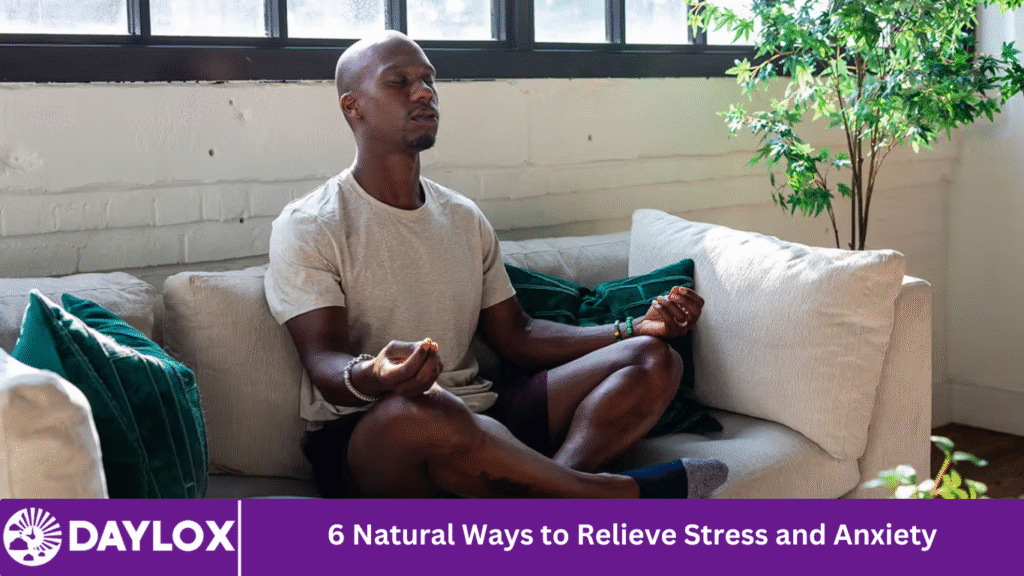Fast-paced world, stress and anxiety have become all too common. From work pressures and financial concerns to personal challenges and health worries, life throws a lot at us. While medication and therapy are often essential, many people seek natural ways to relieve stress and anxiety as part of a holistic lifestyle.
Fortunately, nature offers powerful remedies to help us manage emotional tension and restore a sense of calm. In this article, we’ll explore six scientifically backed, natural methods to reduce stress and anxiety, helping you feel more grounded, focused, and peaceful.
More Read: How to Create a Self-Care Routine That Sticks
1. Practice Mindful Meditation
Keywords: meditation for stress, mindfulness techniques, natural anxiety relief
Mindful meditation has been used for centuries to calm the mind and improve mental clarity. It involves focusing your attention on the present moment without judgment. Even just 10 to 20 minutes of daily mindfulness practice can significantly reduce stress levels and promote emotional balance.
How It Helps:
- Reduces activity in the amygdala, the brain’s stress center
- Lowers cortisol (stress hormone) levels
- Improves focus, sleep, and overall emotional regulation
How to Get Started:
- Find a quiet place and sit comfortably
- Focus on your breath, bodily sensations, or a calming phrase
- Let thoughts come and go without attachment
- Apps like Headspace, Calm, or Insight Timer can guide you
Regular practice leads to greater resilience to stress and improved mental health over time.
2. Exercise Regularly
Keywords: exercise for anxiety, stress relief workout, natural stress reducer
Physical activity isn’t just good for your body—it’s one of the most effective natural ways to combat anxiety and stress. Whether it’s a brisk walk, a morning jog, yoga, or weight training, regular exercise releases endorphins, the body’s natural feel-good chemicals.
Benefits:
- Enhances mood and reduces anxiety symptoms
- Improves sleep quality
- Helps regulate stress hormones
- Boosts self-confidence and brain function
Best Exercises for Stress Relief:
- Yoga: Combines movement with breath control and mindfulness
- Aerobic exercises: Running, swimming, biking, or dancing
- Strength training: Lifting weights can reduce anxiety and depression
Just 30 minutes a day, 4–5 times a week, can significantly improve your stress response and emotional well-being.
3. Use Herbal Remedies and Adaptogens
Keywords: herbal supplements for anxiety, adaptogens for stress, natural calming herbs
Many herbs and natural supplements have been shown to reduce stress and promote relaxation. Adaptogens are a class of herbs that help the body adapt to stress and restore balance.
Popular Natural Remedies:
- Ashwagandha: An adaptogen that reduces cortisol and calms the nervous system
- Rhodiola Rosea: Improves energy and resilience under stress
- Chamomile: Known for its calming properties, especially in tea form
- Lavender: Can be used as essential oil, tea, or supplement to reduce anxiety
- Passionflower: Helps reduce insomnia and anxiety
Important Note:
Always consult with a healthcare provider before starting herbal supplements, especially if you’re on medications or have pre-existing conditions.
4. Prioritize Sleep and Relaxation
Keywords: sleep and stress relief, how to sleep better naturally, relaxing bedtime routine
Lack of sleep can significantly increase stress and worsen anxiety. A good night’s rest helps your body and mind recover from daily stressors and prepares you for the day ahead.
Tips for Better Sleep:
- Establish a consistent bedtime and wake-up routine
- Avoid screens and bright lights at least an hour before bed
- Create a calm environment (cool, dark, and quiet)
- Use relaxation techniques like deep breathing or progressive muscle relaxation
- Try herbal teas like chamomile or lemon balm before bed
Aim for 7–9 hours of quality sleep each night. Better sleep naturally reduces irritability, enhances emotional control, and improves overall mental clarity.
5. Eat a Balanced, Anti-Stress Diet
Keywords: foods that reduce stress, anxiety-fighting nutrients, healthy diet for stress
What you eat affects your brain chemistry and mood. A poor diet can increase inflammation, blood sugar crashes, and hormonal imbalances—all of which can worsen stress and anxiety.
Best Foods for Stress and Anxiety Relief:
- Fatty fish (like salmon): Rich in omega-3s that reduce inflammation and improve brain function
- Leafy greens: Packed with magnesium and B vitamins that help manage stress
- Nuts and seeds: High in healthy fats, magnesium, and protein
- Berries: Antioxidant-rich and good for brain health
- Whole grains: Help regulate blood sugar and mood
- Dark chocolate: In moderation, boosts serotonin and reduces stress hormones
Avoid excessive caffeine, sugar, processed foods, and alcohol. Hydration is equally essential—dehydration can worsen symptoms of anxiety.
6. Connect with Nature and Practice Grounding
Keywords: grounding techniques, nature therapy, eco-therapy for stress
Spending time in nature is a powerful, free, and natural stress reliever. Studies show that being in green spaces—even for just 20 minutes—can lower cortisol levels and increase feelings of calm and happiness.
Grounding Techniques:
- Walk barefoot on grass or sand
- Sit under a tree or lie on the ground and breathe deeply
- Practice deep breathing or mindfulness outdoors
- Engage in gardening, hiking, or nature walks
Nature exposure helps regulate the nervous system, improves mood, and fosters a sense of peace and connection—essential components of managing anxiety.
Bonus Tips for Natural Stress Relief
Though not part of the main six, the following strategies can enhance your well-being:
- Journaling: Helps process emotions and reduce mental clutter
- Gratitude practice: Shifts focus from stress to appreciation
- Digital detox: Reduces overstimulation from constant notifications
- Creative hobbies: Art, music, dance, or writing can be therapeutic
- Laughter: A powerful stress-relief tool—watch a comedy or spend time with uplifting people
When to Seek Professional Help
Natural remedies for stress and anxiety are powerful, but they’re not a replacement for professional care. If you experience:
- Persistent anxiety that affects your daily life
- Trouble functioning at work or in relationships
- Panic attacks or suicidal thoughts
… it’s essential to reach out to a mental health professional. Therapy, counseling, and medical treatment can make a life-changing difference.
Frequently Asked Question
What are the most effective natural ways to relieve stress and anxiety?
Some of the most effective natural methods include mindfulness meditation, regular exercise, herbal supplements like ashwagandha or chamomile, getting quality sleep, eating a balanced diet, and spending time in nature.
How long does it take for natural remedies to reduce anxiety?
The effects of natural remedies can vary. Practices like deep breathing or meditation may offer immediate relief, while herbal supplements and lifestyle changes typically take a few weeks of consistent use to show noticeable improvements.
Can I manage anxiety without medication?
Yes, many people successfully manage mild to moderate anxiety with natural methods like stress-reducing exercises, healthy nutrition, sleep improvement, and mindfulness. However, severe anxiety may require medical or psychological intervention.
Which foods help reduce anxiety and stress naturally?
Foods rich in magnesium, omega-3 fatty acids, and antioxidants help ease stress. Examples include salmon, spinach, blueberries, dark chocolate, almonds, and whole grains.
Is meditation really effective for anxiety?
Yes. Studies show that mindfulness meditation can significantly reduce anxiety by calming the nervous system, lowering cortisol levels, and improving emotionalregulation over time.
Are herbal remedies safe for long-term use?
Many herbs like ashwagandha, chamomile, and lavender are considered safe for long-term use when taken correctly. However, always consult a healthcare provider before starting any herbal supplement, especially if you’re on medication.
What is grounding, and how does it relieve stress?
Grounding involves reconnecting with nature or the earth—like walking barefoot on grass or sitting outdoors. It helps reduce anxiety by calming the nervous system, lowering stress hormones, and increasing feelings of peace and presence.
Conclusion
Stress and anxiety are normal parts of life, but they don’t have to control you. These six natural ways to relieve stress and anxiety—from meditation and exercise to herbal support and time in nature—offer effective, sustainable methods to restore your peace and balance. Consistency is key. Try incorporating one or two of these strategies into your routine today. Over time, small changes lead to powerful shifts in your emotional and mental well-being. Remember: taking care of your mind is just as important as taking care of your body. And nature often provides the best medicine.


